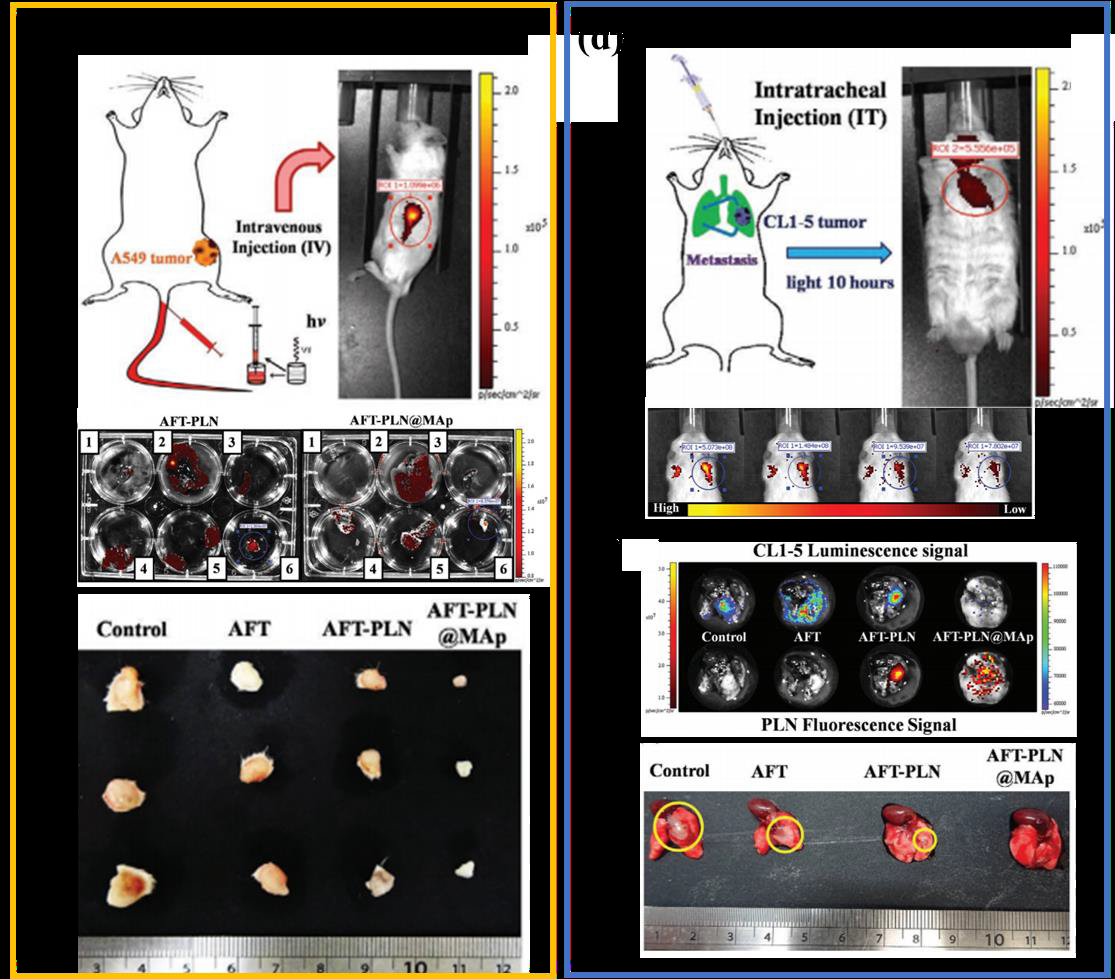開發具轉移型腫瘤靶向性之近紅外光長餘輝奈米材料用於肺癌化療
Development of Metastatic Tumor-Targeting NIR Persistent Luminescence Nanomaterials to Chemotherapy for Lung Cancer
癌症,為十大死因之首,其中癌症死亡率最高為肺癌,然當前問題為其治療手段中無法進行特異性靶向或追踪靶向藥物以進行有效治療。以原位肺腺癌(lung adenocarcinoma; LUAD)為模型開展治療相關之研究鮮少出現。因此,有效安全地進行LUAD診斷與治療為此次研究之重點。
近紅外長餘暉奈米粒子(near-infrared persistent luminescent nanoparticle; NIR PLN)具特殊之放光特性,可保留吸收之光子能量數小時並放出至少持續一至二小時。此一新型之PLN與稱為MAGE-A3適體(Map)之特定適體序列複合,可於肺癌細胞中有效累積,並釋放Afatinib (AFT)抑制癌細胞生長,提供一診斷治療之平台。
本實驗將用於一線靶標治療之AFT裝載至中孔洞中,於12小時內連續釋放藥物,並經MAp特異性結合,將整個系統主動轉運至腫瘤,最後以不同給藥方式(氣管內I.T.;皮下S.C.;靜脈內I.V.)進行LUAD之小鼠模型評估。根據實驗結果,AFT@PLN-MAp已成功地抑制LUAD之生長與轉移,從而發展成為治療晚期肺癌患者之實際臨床治療方案。
Cancer is the top ten cause of death. Among them, lung cancer has the highest mortality rate. However, the current problem is that it is impossible to specifically target or track targeted drugs for effective treatment. Treatment-related research using lung adenocarcinoma (LUAD) as a model is rarely seen. Therefore, effective and safe diagnosis and treatment of LUAD is the focus of this research.
Near-infrared persistent luminescent nanoparticle (NIR PLN) has special luminescence characteristics, which can retain the absorbed photon energy for several hours and release it for at least one to two hours. This new type of PLN is compounded with a specific aptamer sequence called MAGE-A3 aptamer (Map), which can effectively accumulate in lung cancer cells and release Afatinib (AFT) to inhibit the growth of cancer cells, providing a platform for diagnosis and treatment.
In this experiment, AFT used for first-line target therapy was loaded into the mesoporous cavity, and the drug was continuously released within 12 hours, and the entire system was actively transported to the tumor through the specific binding of MAp, and finally administered in different ways (intratracheal IT; Subcutaneous SC; Intravenous IV) The mouse model of LUAD was evaluated. According to the experimental results, AFT@PLN-MAp has successfully inhibited the growth and metastasis of LUAD and has developed into an actual clinical treatment plan for patients with advanced lung cancer.
